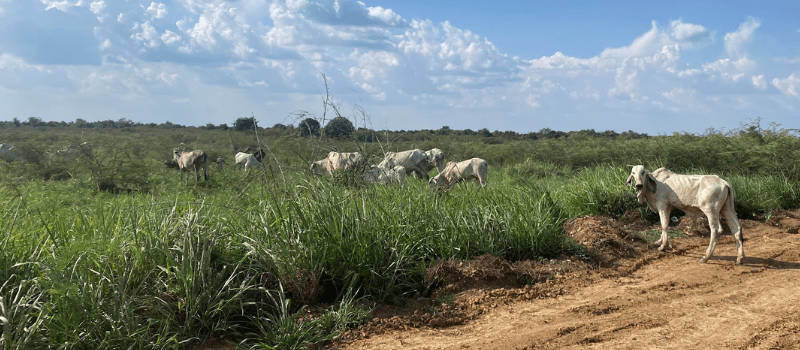#VETSVolunteerVoices aims to bring you the stories of our passionate VETS program volunteers from the field. Meet Elise Tessier, an Epidemiology Advisor who spent two months in Cambodia (March–May 2025) supporting a zoonotic disease risk reduction project with our local partner, AVSF Cambodia.
From Human Health to One Health
As an infectious disease epidemiologist, I’ve always been fascinated by how diseases spread through populations. My work has mostly focused on human-to-human transmission, but the more I learned about zoonoses, the more I became drawn to the interconnectedness of human health, animal health, and the environment. With increasing global travel, urbanization, and climate change, the risks of zoonotic events are rising. The early detection of diseases and effective plans to mitigate outbreaks are more important now than ever to protect the population.
Growing up in a small town in Nova Scotia, I saw firsthand how demanding agricultural work and fishing are, and how they require a deep connection to the land. I benefited from access to fresh, high-quality food. At the same time, I saw how vulnerable the sector is to challenges like extreme weather and animal illness, both of which can have serious economic and social consequences.
When I saw the posting for an Epidemiologist Advisor through Veterinarians Without Borders, I jumped at the chance. It was a perfect opportunity to apply my epidemiology skills, learn more about veterinary science and One Health, and explore a country I’d never visited.
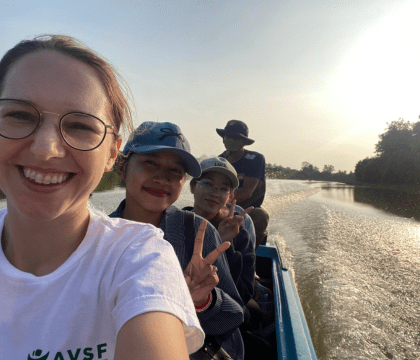 PHOTO: Elise and AVSF en route to the floating villages.
PHOTO: Elise and AVSF en route to the floating villages.
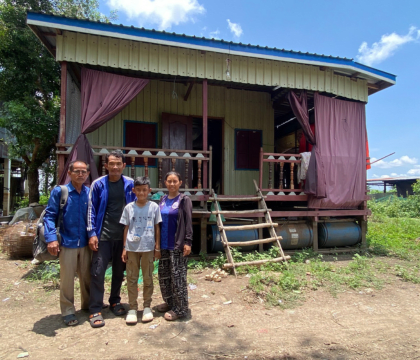 PHOTO: Floating family home on dry land for the season.
PHOTO: Floating family home on dry land for the season.
 PHOTO: Puppy living in the floating villages of Aek Phnom District.
PHOTO: Puppy living in the floating villages of Aek Phnom District.
One Joining the AfriCam Project with AVSF
My placement was with Agronomes & Vétérinaires Sans Frontières (AVSF) in Phnom Penh, the capital of Cambodia. AVSF is supporting the initial phase of a four-year, multi-country, multi-partner project called AfriCam. The goal of AfriCam is to reduce the risk of emerging zoonotic diseases by applying a One Health approach in the context of environmental, climate, and social change in selected countries in Africa and Cambodia [1].
More than half of Cambodian households engage in agriculture, and nearly 60% of those raise livestock or poultry [2]. Fishing is also vital, particularly in the Tonle Sap and its surrounding rivers. The Tonle Sap—Southeast Asia’s largest freshwater lake—has a unique bi-directional flow that creates rich breeding grounds for fish, migratory birds, and other wildlife [3].
AVSF’s role was to lead a Knowledge, Attitudes and Practices (KAP) survey on zoonotic risk perception and perceptions of gender and climate change. KAP surveys are useful tools to understand factors associated with people’s knowledge and behaviours towards zoonoses in their everyday life.
Strengthening Skills and Systems Through Mutual Learning
As the Epidemiology Advisor, I helped with survey design, preparing the sampling strategy (with a focus on gender equity), deploying the survey in the field, and supporting data analysis. I helped guide AVSF staff responsible for the KAP survey on study design and basic epidemiology concepts, and taught the enumerators how to reduce bias when selecting and interviewing participants in the field.
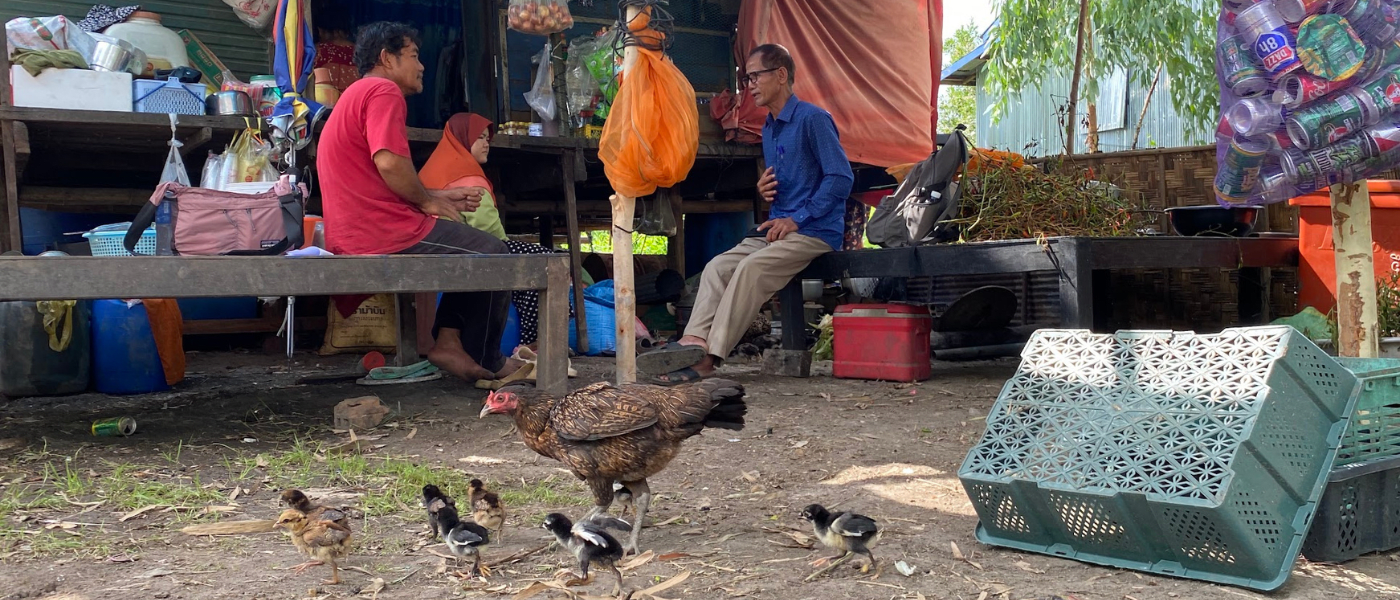 PHOTO: An AVSF enumerator (right) interviews a family in a floating village in Aek Phnom District, as the family’s chickens wander past.
PHOTO: An AVSF enumerator (right) interviews a family in a floating village in Aek Phnom District, as the family’s chickens wander past.
In the evenings, I developed teaching materials for R Studio and Zotero, so AVSF staff could analyze the KAP survey results and collate and reference similar studies. Most of the training focused on how to use R Studio. We covered everything from downloading the software, creating a project, writing scripts, and performing data manipulation, all the way to using APIs to fetch data securely and conducting statistical analyses such as regression.
We even started a journal club, in which we read a peer-reviewed article on KAP studies for zoonotic diseases and then discussed the presentation and findings together as a group. I also conducted training on how the staff could use AI to streamline some of their daily tasks, enhance their research, and draft reports more efficiently.
When I didn’t understand concepts related to agriculture or veterinary science, the AVSF team was quick to share their expertise—truly a mutual learning and collaboration experience.
Into the Floating Villages
Making new friends and conducting fieldwork was the most memorable part. Throughout my time with AVSF, we conducted surveys in 12 villages in Aek Phnom District, an area with rivers that flow to and from both the Mekong River and the Tonle Sap. Because it was dry season, we faced additional challenges reaching the floating villages and had to take three modes of transportation—bus, truck, and boat—to reach our destination. We all got very muddy!
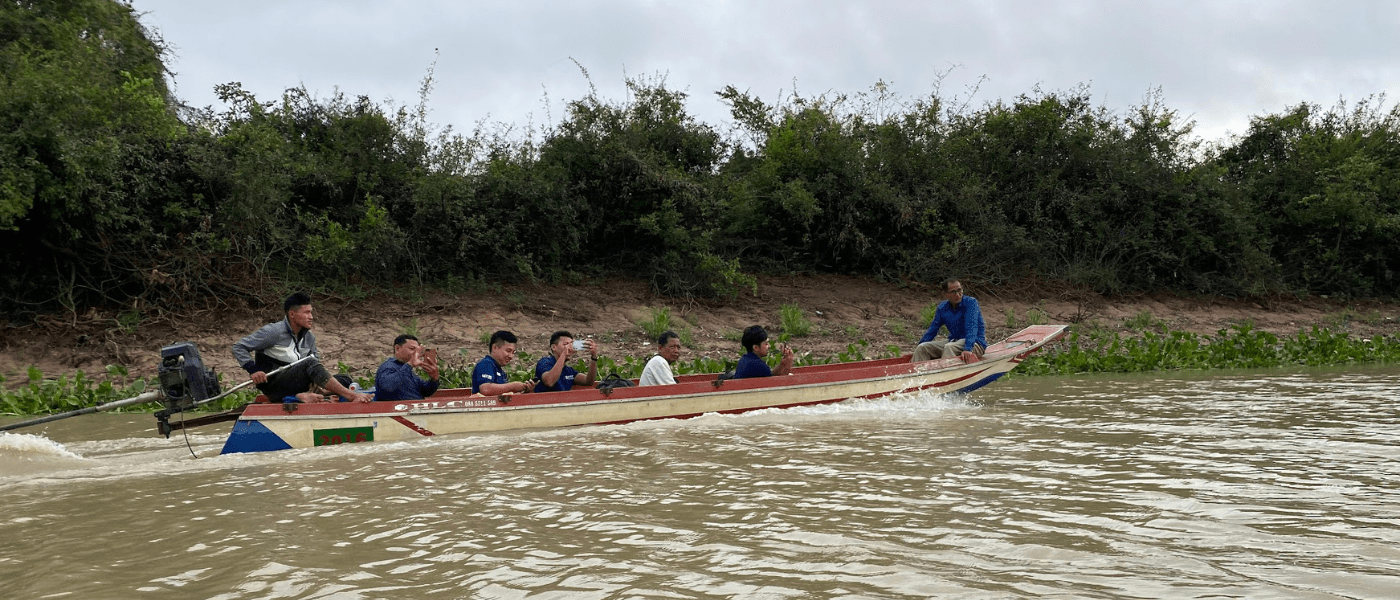 PHOTO: Enumerators en route by boat to a floating village in Aek Phnom District to conduct household surveys.
PHOTO: Enumerators en route by boat to a floating village in Aek Phnom District to conduct household surveys.
While conducting surveys in the floating villages, we stayed at the secondary school, which serves children from the surrounding communities. I learned that some children commute by boat for up to two hours to reach the school and board from Monday to Saturday in order to access their education.
From Fieldwork to Findings
Since returning home, I’ve continued to support the team remotely with data analysis and report writing. So far, the results suggest that factors linked to lower levels of knowledge aren’t necessarily associated with less favourable attitudes or practices. These results are key to understanding what strategies may work best when implementing early detection and community-level surveillance.
The preliminary findings were recently presented by AVSF at the General AfriCam meeting, which I attended virtually. The results also complement findings from other ongoing AfriCam studies. AVSF’s next steps include planning future awareness campaigns and training sessions based on the gaps identified in our KAP survey. We are also preparing a peer-reviewed manuscript for publication.
Collaboration, Culture, and Canadian Maple Syrup
Beyond the technical work, VWB and AVSF made me feel truly welcome. I was grateful that an AVSF staff member was always just a phone call or email away to answer my questions. I also had the opportunity to meet Ian Parfitt, who was volunteering in the Preah Vihear Province. It was great to share my experience with Ian, as neither of us had a veterinary background and both held technical advisory roles. Ian even taught me how to use QGIS so I could create maps for our research, and print detailed village maps that helped us count households and plan our sampling strategy.
AVSF’s commitment to high-quality work was inspiring, and they also made sure I experienced Cambodian culture. I participated in a blessing ceremony, where a monk from the local monastery blessed the office, followed by a celebration with delicious food and traditional Cambodian music. I also ate the best mangoes and cashews I’ve ever had! In return, I shared a little piece of home by making pancakes—served with Canadian maple syrup.
Grateful for a Transformative Experience
This unforgettable experience was made possible thanks to VWB and the VETS program, funded by Global Affairs Canada. I’m so grateful to have been part of this important work and to have learned so much about One Health, Cambodia, and myself along the way.
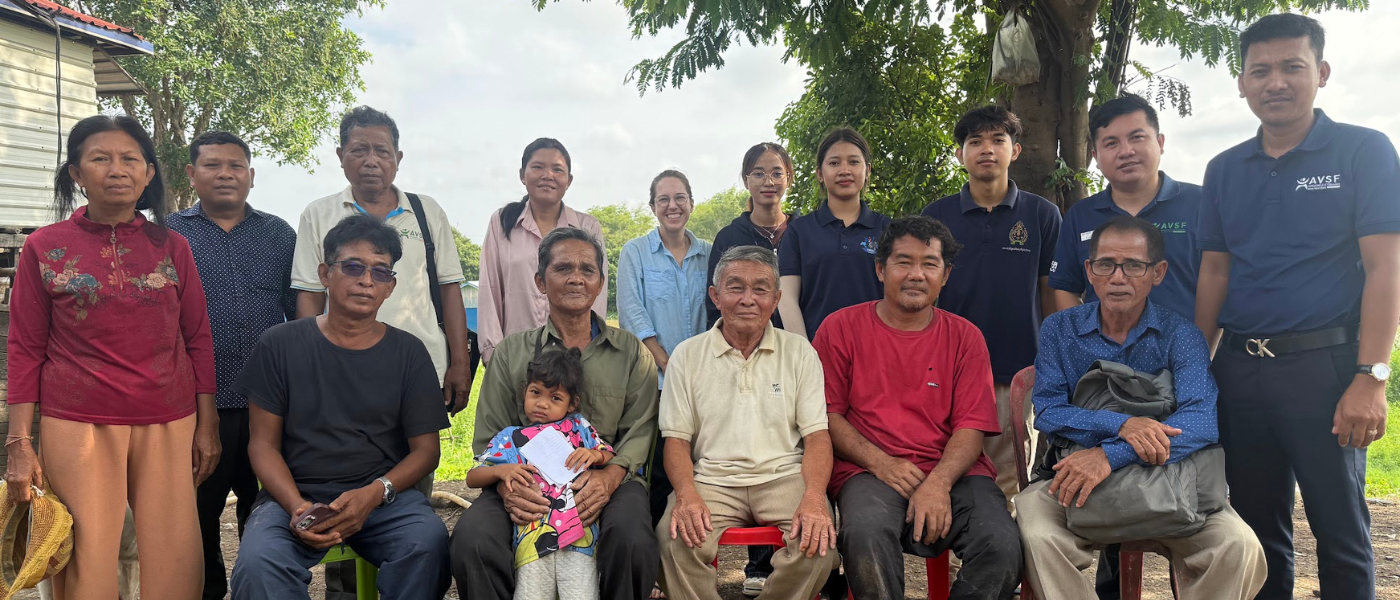 PHOTO: Elise (back row, center) gathers with the village chief, community, and enumerators in a floating village in Aek Phnom District for a moment of connection during the surveys.
PHOTO: Elise (back row, center) gathers with the village chief, community, and enumerators in a floating village in Aek Phnom District for a moment of connection during the surveys.
References
- CIRAD. Preventing zoonotic disease emergence in Africa and Cambodia. CIRAD. (2025).
- National Institute of Statistics, Ministry of Planning. Census of Agriculture Cambodia 2023: National Report on Final Census Results. (2025).
- Asia Development Bank. The Tonle Sap Basin Strategy. (2005).
VETS is an 8-year initiative (2020-2028) to improve the economic and social well-being of marginalized people, particularly women and girls, in 6 countries across Africa and Asia. In collaboration with local partners, the program is implemented through 190 Canadian volunteers on international assignment and is generously funded by Global Affairs Canada. Learn more.

